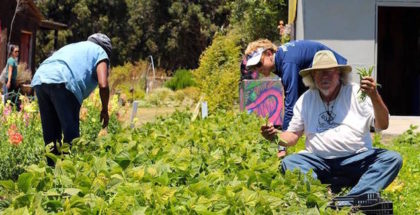Coalition Fights Food Waste to End Hunger in Orange County, CA
January 9, 2017 | AJ Hughes
When Santa Ana, California pediatrician and Orange County Public Health Officer Eric Handler ran into Mark Lowry of the Orange County Food Bank some years ago, he had two questions for him:
- Do you have enough food in your food bank?
- If we captured all food waste, could we end hunger in Orange County?
Lowry’s answer to the first question was no, and his answer to the second question was yes. This interaction led to the formation of the Waste Not OC Coalition in 2012.
With an overarching goal to eradicate hunger in Orange County, the Waste Not OC Coalition recovers food by connecting restaurants and grocery stores with food recovery agencies. It distributes that food by connecting people in need with food pantries. It also educates donors, recipients and the general public about the importance of food donation and how to safely handle donated food.
A public-private partnership, the Coalition was formally started by one of its current partners, the Orange County Health Care Agency. Some of its other partners include Community SeniorServ, Food Finders, Orange County Food Bank, and Second Harvest Food Bank.
The Coalition’s work got underway with an Anaheim-Orange pilot project, a dual effort between the two cities to find sources of recoverable food and educate potential donors about the importance of redirecting food that would otherwise go to waste. Between July and December 2014, this project resulted in the recovery of 42.7 tons of food.
The Coalition also works with area clinics to determine who is in need of food aid. A screening tool has been implemented by the Children’s Hospital of Orange County to identify those who are food insecure. Once those who would benefit from food aid have been identified, hospital staff then directs them to the Waste Not OC Coalition’s Google Map of food pantries.
In 2015 and through a partnership with the Anaheim City School District, three schools started food recovery pilot projects that call for donations of excess food to local pantries. Now the Coalition is engaged in similar collaborations with Anaheim Union High School District, Fullerton School District and Irvine Unified School District, as well as five area private schools. The Coalition is also working with Cal State Fullerton and UC Irvine to establish food pantries on their campuses.
Future projects include OC Central Kitchen, which would follow in the footsteps of the DC Central Kitchen, an establishment in Washington, D.C. that puts ‘wasted’ food to use while also training the unemployed for culinary jobs. In a similar vein, the Coalition, through partnerships with Community SeniorServ and the Orange County Youth Probation Department, hopes to launch a program in which Culinary Institute chefs can train at-risk youth in their craft.
Despite Orange County’s image as home to beautiful beaches, famous amusement parks, giant shopping malls and affluent neighborhoods, Handler says the need to fight hunger in the county is acute.
“One in five children in Orange County is food insecure,” he says.
So far, the Waste Not OC Coalition has made its mark in this fight against hunger. According to Handler, the organization has helped facilitate the donation of 280 tons of food during the past 18 months. But more food is needed and, as Handler says, “We’re always looking for more donations.”
Despite operating on what Handler describes as a “shoestring budget,” support from other agencies has boosted the Coalition’s efforts. The United Way has given $50,000, and the Coalition enjoys the support of the Orange County Board of Supervisors. This kind of support, according to Handler, ensures that the Waste Not OC Coalition can continue in its important work.
“When you find champions that are passionate, obstacles can be overcome,” he says. “It’s possible to end hunger in Orange County.”
Others have noticed the inroads that the Waste Not OC Coalition has made in combating the problem of hunger. Earlier this year, the Coalition was recognized by the National Association of City and County Officials as a model public agency.
According to Handler, such recognition has led other cities and counties to express a desire to start similar efforts. “We’ve had conversations with people in Boston,” he says, “[and] San Diego, Santa Barbara, Los Angeles, Alameda and Marin counties all want to replicate this.”













Submit a Comment